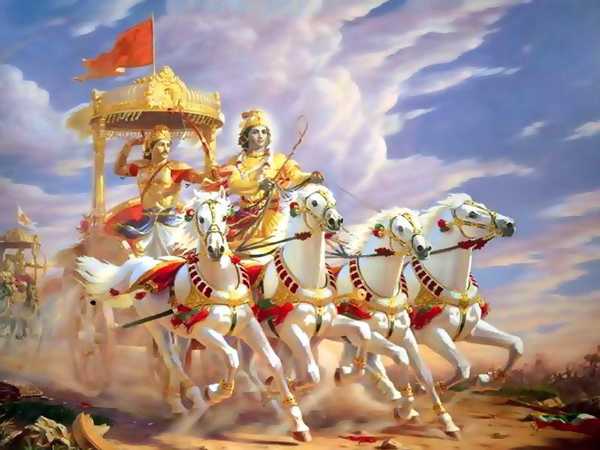Chapter 15

“Yudhishthira said,–“Intelligent as thou art, thou hast said what noneelse is capable of saying. There is none else on earth who is settler ofall doubts. Behold, there are kings in every province employed inbenefiting their respective selves. But no one amongst them hath beenable to achieve the imperial dignity.
Indeed, the title emperor isdifficult of acquisition. He that knoweth the valour and strength ofothers never applaudeth himself. He, indeed, is really worthy of applause(worship) who, engaged in encounters with his enemies, beareth himselfcommendably. O thou supporter of the dignity of the Vrishni race, man’sdesires and propensities, like the wide earth itself adorned with manyjewels, are varied and extensive. As experience can seldom be gained butby travelling in regions remote from one’s home, so salvation can neverbe attained except by acting according to principles that are very high,compared with the ordinary level of our desire and propensities. I regardpeace of mind as the highest object here, for from that quality mayproceed my prosperity. In my judgment, if I undertake to celebrate thissacrifice, I shall never win the highest reward. O Janardana, endued withenergy and intelligence, these that have been born in our race think thatsome one amongst them will at one time become the foremost amongst allKshatriyas. But, O exalted one, we also were all frightened by the fearof Jarasandha and, O sinless one, by the wickedness of that monarch. Othou invincible in battle, the might of thy arm is my refuge. When,therefore, thou taken fright at Jarasandha’s might, how should I regardmyself strong in comparison with him? Madhava, O thou of the Vrishnirace, I am repeatedly depressed by the thought whether Jarasandha iscapable or not of being slain by thee, by Rama, by Bhimasena, or byArjuna. But what shall I say, O Keshava? Thou art my highest authority oneverything.’
“On hearing these words, Bhima well-skilled in speech said,–‘That kingwho is without exertion, or who being weak and without resources enterethinto hostility with one that is strong, perisheth like an ant-hill. Itmay be generally seen, however, that even a king that is weak mayvanquish an enemy that is strong and obtain the fruition of all hiswishes, by wakefulness and by the application of policy. In Krishna ispolicy, in myself strength, in Arjuna triumphs. So like the three(sacrificial) fires that accomplish a sacrifice, we shall accomplish thedeath of the king of Magadha.”
“Krishna then said,–‘One that is immature in understanding seeketh thefruition of his desire without an eye to what may happen to him infuture. It is seen that no one forgiveth for that reason a foe that is ofimmature understanding and inclined to serve his own interests. It hathbeen heard by us that in the krita age, having brought every one undertheir subjection, Yauvanaswin by the abolition of all taxes, Bhagirathaby his kind treatment to his subjects, Kartavirya by the energy of hisasceticism, the lord Bharata by his strength and valour, and Maruta byhis prosperity, all these five became emperors. But, O Yudhishthira, thouwho covetest the imperial dignity deserves it, not by one but by allthese qualities, viz., victory, protection afforded to thy people,virtue, prosperity, and policy. Know, O bull of the Kuru race, thatJarasandha, the son of Vrihadratha, is even such (i.e., a candidate forthe imperial dignity). A hundred dynasties of kings have become unable tooppose Jarasandha. He, therefore, may be regarded to be an emperor forhis strength. Kings that are wearers of jewels worship Jarasandha (withpresents of jewels). But, wicked from his childhood, he is scarcelysatisfied with such worship. Having become the foremost among all, heattacketh yet with violence kings with crowns on their heads. Nor isthere seen any king from whom he taketh not tribute. Thus hath he broughtunder his sway nearly a hundred kings. How can, O son of Pritha, any weakmonarch approach him with hostile intentions? Confined in the temple ofShiva and offered as sacrifice unto him like so many animals, do notthese monarchs dedicated unto that god feel the most poignant misery, Obull of the Bharata race? A Kshatriya that dieth in battle is everregarded with respect. Why shall we not, therefore, meet together andoppose Jarsandha in battle? He hath already brought eighty-six kings;fourteen only are wanting to complete one hundred. As soon as heobtaineth those fourteen, he will begin his cruel act. He that shall beto obstruct that act will surely win blazing renown. And he that willvanquish Jarasandha will surely become the emperor of all theKshatriyas.'”




